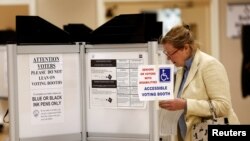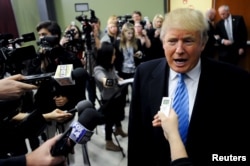Former Secretary of State Hillary Clinton was projected to be the big winner of the last primary in the 2016 presidential campaign, held Tuesday in Washington, D.C.
Clinton already had enough delegates to be the presumptive Democratic nominee.
Clinton and her rival for the nomination, Vermont Senator Bernie Sanders, met Tuesday night in the nation's capital to talk about the Democratic Party platform to be drawn up at this summer's convention.
Sanders is promising "the most progressive platform ever passed" by the Democrats.
He told reporters it would be "crystal clear that the Democratic Party is in fact on the side of working people. ... The time is long overdue for a fundamental transformation of the Democratic Party."
Many progressive and ultra-liberal Democrats have complained that the party has become too centrist and too willing to compromise with Republicans, making it seem as if there is little difference between the two major parties.
Clinton did not talk about her meeting with Sanders, but a Clinton campaign official had told the Reuters news service that she was looking forward to the chance to discuss how to move forward with what the official called "their shared commitment to a progressive agenda" and stopping Donald Trump, the presumptive Republican presidential nominee.
Media effect
Meanwhile, media coverage during the past year has boosted Trump's popularity at Clinton's expense, but that has not stopped Clinton from widening her lead over Trump, according to findings from a Harvard University study and a new poll.
A study released Tuesday by Harvard's Shorenstein Center on Media, Politics and Public Policy said Trump has disproportionately benefited from news coverage of his campaign, although Trump has regularly complained the media has treated him unfairly.
Despite the study's findings, Trump announced Monday he was banning The Washington Post from campaign events, extending the list of banned media organizations to more than a half dozen.
In response to the ban, the White House Correspondents Association criticized Trump for "arbitrarily" banning news outlets.
"Any nominee for the highest office in the country must respect the role of a free and adversarial press, not disown the principles of the First Amendment just because he or she does not like the tone or content of their coverage," president Carol Lee said in a statement Tuesday.
The study found Trump received 34 percent of the media's coverage of the Republican primaries, far more than any of his Republican rivals. Jeb Bush came in second with 18 percent. Trump's media coverage was worth about $55 million, compared with $19 million for Bush.
The report said that because Trump had no political experience or voter base, he resorted to the use of harsh rhetoric to compete with party rivals Bush, Ted Cruz and Marco Rubio.
"The politics of outrage was [Trump's] edge, and the press became his dependable if unwitting ally," the report said. And "Trump exploited [the media's] lust for riveting stories," the report found.
Less coverage of Democrats
The media was not as generous to the Democratic presidential candidates, particularly during the early days of the campaign season, the study said. The media coverage was significantly less, but Clinton enjoyed substantial leads in polls over Sanders and other democratic hopefuls.
As media coverage of Trump boosted his poll ratings, it gradually eroded Clinton's advantage. Moreover, the study found that 84 percent of the issue-related coverage of Clinton was negative.
The report was based on an analysis of coverage from eight print and broadcast news outlets: CBS, Fox, the Los Angeles Times, NBC, The New York Times, USA Today, The Wall Street Journal and The Washington Post.
Despite the study's findings, a poll released Tuesday showed Clinton had widened her lead over Trump, 49 percent to 42 percent.
The poll, conducted by NBC News and SurveyMonkey, was conducted last week, when Clinton secured enough delegates to become the presumptive Democratic nominee. It was also the week in which Trump was roundly criticized for claiming a federal judge was biased because of his Mexican heritage.
Republicans hold their convention in Cleveland July 18-21. The Democrats gather in Philadelphia July 25-28.













